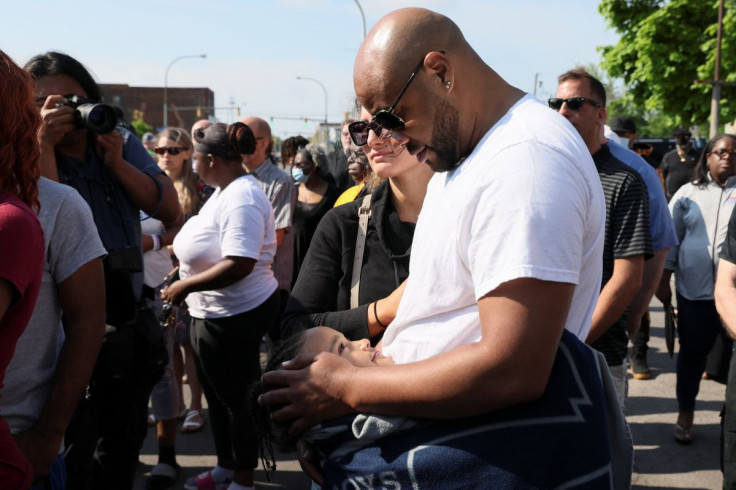Buffalo's Black Community Stunned After Being Visited By 'Evil'

The Tops Friendly Market chosen by the white gunman to launch his deadly racist attack on Saturday served as an anchor of sorts for the Black community along Buffalo's Jefferson Avenue, one of the few places where residents could buy groceries.
Now even that modest sanctuary no longer feels safe to many Black people in Buffalo, which takes pride in its nickname "the City of Good Neighbors."
Not after 18-year-old Payton Gendron, dressed in camouflage and body armor and wielding a rifle with a high-capacity magazine, drove into the supermarket parking lot in broad daylight and opened fire, killing 10 and wounding three others. Eleven of the 13 victims were Black.
"Somebody knew enough to know the one store our community has," said Denise Glenn, an activist from VOICE Buffalo, speaking to the clutch of about 100 people who gathered on Sunday morning outside Tops, which had been cordoned off by police tape and adorned with flowers and makeshift memorials.
Glenn was alluding to the chilling news that the gunman had driven for hours from his home to target the store, having selected it because of the neighborhood's high concentration of Black residents, according to authorities.
"That was an evil, racist, white supremacist," Reverend Darius Pridgen said from the pulpit at True Bethel Baptist Church on Sunday. "He literally looked for a zip code that had the highest concentration of African Americans."
The worshipers at the predominantly Black church, about a five-minute drive from Tops, included family of the victims and some of those who were at the store when the rampage unfolded.
Rev. Pridgen invited members of the congregation who were touched by the shooting to come to the front of the church and share their experiences. One by one, they came forward.
Charles Everhart Sr., 65, told his fellow worshipers that his grandson Zaire Goodman, a 20-year-old Tops employee, was shot in the neck but somehow survived. "He was pushing the carts back to the store and he was one of the first to get hit," Everhart said.
At the vigil outside the supermarket, anger and stunned disbelief mixed with feelings of helplessness and grief. The crowd sang "Amazing Grace." Many broke down into tears.
'SO MUCH TRAUMA'
Employees of the store huddled together, trying to comfort one another. Volunteers grilled food and handed out water. Dozens of police officers milled around, and the surrounding blocks remained sealed off, reinforcing a sense of dread and disruption.
Tyrell Ford, 36, lead community organizer of Voices Buffalo, a non-profit group that organized the vigil, said he was still trying to work through what had happened.
"There's so much trauma in the Black community and this is the time to start the process of grieving," he said. "This causes mental health problems and trust issues in our community. You can see how vibrant our community is."
The calculated nature of the attack, as described by law enforcement, may well have amplified the siege mentality being felt by some local residents.
A document circulating online that appeared to have been written by the killer sketched out a to-do list for the attack, including purchasing tactical equipment and testing his upload speeds for the livestream.
In addition, a 180-page manifesto outlining 'The Great Replacement Theory' - the racist conspiracy theory that white people are being replaced by minorities in the United States and other countries - also circulated online, reportedly authored by Gendron.
Julie Harwell, 33, was one of those who found themselves in the wrong place at the wrong time on Saturday afternoon: shopping for birthday party supplies at Tops with her daughter and the girl's father. Then the gunshots started.
"I thought it was just a normal, neighborhood shooting, so we ducked," Harwell said. "Once it didn't stop, something told me to get up and start running because I heard footsteps. He was shooting people twice to make sure they were dead."
"I saw a lot of stuff I'd never seen," she said, "and that I thought my daughter would never see."
© Copyright Thomson Reuters 2024. All rights reserved.





















